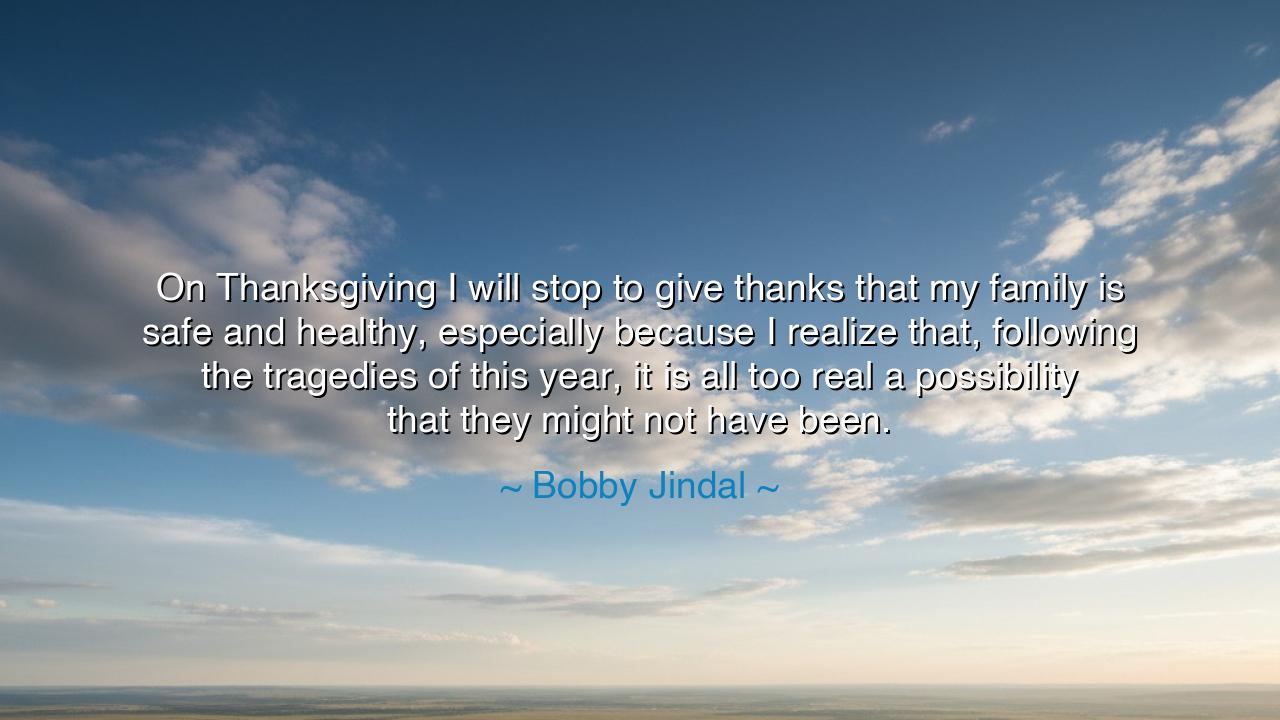
On Thanksgiving I will stop to give thanks that my family is
On Thanksgiving I will stop to give thanks that my family is safe and healthy, especially because I realize that, following the tragedies of this year, it is all too real a possibility that they might not have been.






"On Thanksgiving I will stop to give thanks that my family is safe and healthy, especially because I realize that, following the tragedies of this year, it is all too real a possibility that they might not have been." In this deeply moving reflection, Bobby Jindal reveals the fragile truth that lies at the heart of gratitude. His words remind us that safety and health—so often taken for granted—are in fact precious gifts, not guarantees. Thanksgiving becomes not merely a feast, but a moment of sober recognition: that the line between joy and sorrow, life and death, is thinner than we dare to admit.
The origin of this thought rests in the reality of tragedy, which strikes without warning and humbles the proudest of hearts. Jindal speaks as one who has seen the world shaken by disaster and sorrow, and who has come to understand that thanksgiving is deepest when it arises out of the awareness of what might have been lost. True gratitude is not shallow cheerfulness; it is the profound relief of the survivor, who knows that the blessings of life are fragile and must be cherished.
History abounds with examples of this kind of thanksgiving born out of suffering. After the Second World War, when peace finally returned to Europe, countless families gathered around humble tables, offering thanks not for abundance but for survival, for the return of sons from battle, for the fact that their homes still stood amidst the ruins. In such moments, thanksgiving was stripped to its essence—not about plenty, but about presence; not about excess, but about life preserved against the odds.
There is a heroic wisdom in pausing, as Jindal says, to stop and give thanks. In a world where routines rush us forward, gratitude often goes unspoken. But tragedy interrupts the illusion of control, reminding us that all is fragile, all is borrowed. To stop is to resist forgetfulness, to humble ourselves before the truth that health, safety, and family are treasures greater than wealth or fame. To stop is to acknowledge that every moment with those we love is already more than we deserve.
Jindal’s words also remind us of the power of memory. It is the memory of tragedy that makes gratitude fierce and authentic. Without memory, thanksgiving becomes empty ritual; with memory, it becomes a fire in the heart. To remember what could have been lost is to cherish what remains with renewed passion. It is to lift a prayer not only for oneself but for all who grieve, knowing that what blesses one family may be absent in another. Gratitude, when born of memory, becomes both tender and strong.
The lesson for future generations is this: do not wait for tragedy to awaken gratitude. Learn now to see health, family, and safety as treasures, even in ordinary days. For the time will come when the ordinary is revealed to be extraordinary, when what you took for granted is revealed to be the very foundation of your joy. Teach children to give thanks not only when abundance is visible, but when the hidden blessings of safety and health quietly uphold their lives.
Practical action flows from this teaching. At the table of Thanksgiving, do not only praise the food, the feast, the moment of celebration. Take time to name aloud the blessings that cannot be seen—safety, health, the presence of loved ones. Remember those who are grieving, and reach out with comfort. Use the awareness of fragility to strengthen bonds, to forgive quarrels, to live with urgency and tenderness. For to give thanks in this way is not mere custom, but the shaping of the soul in the discipline of humility.
Thus, Jindal’s words rise like a solemn hymn: true thanksgiving comes not from abundance alone, but from the awareness of what could have been lost, and the mercy that it was not. To give thanks is to honor the fragility of life and to embrace the sacredness of each moment. This is the thanksgiving that endures beyond the feast, becoming not a single day but a way of seeing, remembering, and living.






AAdministratorAdministrator
Welcome, honored guests. Please leave a comment, we will respond soon